- Home
- James McBride
The Color of Water Page 2
The Color of Water Read online
Page 2
The image of her riding that bicycle typified her whole existence to me. Her oddness, her complete nonawareness of what the world thought of her, a nonchalance in the face of what I perceived to be imminent danger from blacks and whites who disliked her for being a white person in a black world. She saw none of it. She rode so slowly that if you looked at her from a distance it seemed as if she weren’t moving, the image frozen, painted against the spring sky, a middle-aged white woman on an antique bicycle with black kids zipping past her on Sting-Ray bikes and skateboards, popping wheelies and throwing baseballs that whizzed past her head, tossing firecrackers that burst all around her. She ignored it all. She wore a flower-print dress and black loafers, her head swiveling back and forth as she rode shakily past the triangle curve where I played stickball with my friends, up Lewiston Avenue, down the hill on Mayville Street where a lovely kid named Roger got killed in a car accident, back up the hill on Murdock, over the driveway curb, and to the front of our house. She would stop, teetering shakily, catching herself just before the bike collapsed onto the sidewalk. “Whew!” she’d say, while my siblings, camped on the stoop of our house to keep an eye on her, shook their heads. My sister Dotty would say, “I sure wish you wouldn’t ride that bike, Ma,” and I silently agreed, because I didn’t want my friends seeing my white mother out there riding a bicycle. She was already white, that was bad enough, but to go out and ride an old bike that went out of style a hundred years ago? And a grown-up no less? I couldn’t handle it.
As a boy, I always thought my mother was strange. She never cared to socialize with our neighbors. Her past was a mystery she refused to discuss. She drank tea out of a glass. She could speak Yiddish. She had an absolute distrust of authority and an insistence on complete privacy which seemed to make her, and my family, even odder. My family was huge, twelve kids, unlike any other family I’d ever seen, so many of us that at times Mommy would call us by saying, “Hey James—Judy-Henry-Hunter-Kath—whatever your name is, come here a minute.” It wasn’t that she forgot who we were, but there were so many of us, she had no time for silly details like names. She was the commander in chief of my house, because my stepfather did not live with us. He lived in Brooklyn until near the end of his life, staying away from the thronging masses to come home on weekends, bearing food and tricycles and the resolve to fix whatever physical thing we had broken during the week. The nuts and bolts of raising us was left to Mommy, who acted as chief surgeon for bruises (“Put iodine on it”), war secretary (“If somebody hits you, take your fist and crack ‘em”), religious consultant (“Put God first”), chief psychologist (“Don’t think about it”), and financial adviser (“What’s money if your mind is empty?”). Matters involving race and identity she ignored.
As a kid, I remember wishing I were in the TV show Father Knows Best, where the father comes home from work every day wearing a suit and tie and there are only enoughkids to fit on his lap, instead of in my house, where we walked around with huge holes in our pants, cheap Bo-Bo sneakers that cost $1.99 at John’s Bargains store, with parents who were busy and distracted, my stepfather appearing only on weekends in sleeveless T-shirt, tools in hand, and Mommy bearing diapers, pins, washcloths, Q-tips, and a child in each arm with another pulling at her dress. She barely had time to wipe the behind of one child before another began screaming at the top of her lungs. Back in the Red Hook Housing Projects in Brooklyn, where we lived before moving to the relative bliss of St. Albans, Queens, Mommy put us to bed each night like slabs of meat, laying us out three and four to a bed, one with his head to the headboard, the next with his feet to the headboard, and so on. “Head up, toes down,” she called it as she kissed us good night and laid us out in the proper position. The moment she left the room we’d fight over who got to sleep next to the wall. “I got the inside!” I’d shout, and Richard, the brother above me and thus my superior, would shake his head and say, “No, no, no. David sleeps on the inside. I have the middle. You, knucklehead, have the outside,” so all night I’d inhale David’s breath and eat Richie’s toes, and when I couldn’t stand the combination of toes and breath any longer I’d turn over and land on the cold cement floor with a clunk.
It was kill or be killed in my house, and Mommy understood that, in fact created the system. You were left to your own devices or so you thought until you were at your very wits’ end, at which time she would step in and rescue you. I was terrified when it came my turn to go to school. Although P.S. 118 was only eight blocks away, I wasn’t allowed to walk there with my siblings because kindergarten students were required to ride the bus. On the ill-fated morning, Mommy chased me all around the kitchen trying to dress me as my siblings laughed at my terror. “The bus isn’t bad,” one quipped, “except for the snakes.” Another added, “Sometimes the bus never brings you home.” Guffaws all around.
“Be quiet,” Mommy said, inspecting my first-day-of-school attire. My clothes were clean, but not new. The pants had been Billy’s, the shirt was David’s, the coat had been passed down from Dennis to Billy to David to Richie to me. It was a gray coat with a fur collar that had literally been chewed up by somebody. Mommy dusted it off with a whisk broom, set out eight or nine bowls, poured oatmeal in each one, left instructions for the eldest to feed the rest, then ran a comb through my hair. The sensation was like a tractor pulling my curls off. “C’mon,” she said, “I’ll walk you to the bus stop.” Surprise reward. Me and Mommy alone. It was the first time I remember ever being alone with my mother.
It became the high point of my day, a memory so sweet it is burned into my mind like a tattoo, Mommy walking me to the bus stop and every afternoon picking me up, standing on the corner of New Mexico and 114th Road, clad in a brown coat, her black hair tied in a colorful scarf, watching with the rest of the parents as the yellow school bus swung around the corner and came to a stop with a hiss of air brakes.
Gradually, as the weeks passed and the terror of going to school subsided, I began to notice something about my mother, that she looked nothing like the other kids’ mothers. In fact, she looked more like my kindergarten teacher, Mrs. Alexander, who was white. Peering out the window as the bus rounded the corner and the front doors flew open, I noticed that Mommy stood apart from the other mothers, rarely speaking to them. She stood behind them, waiting calmly, hands in her coat pockets, watching intently through the bus windows to see where I was, then smiling and waving as I yelled my greeting to her through the window. She’d quickly grasp my hand as I stepped off the bus, ignoring the stares of the black women as she whisked me away.
One afternoon as we walked home from the bus stop, I asked Mommy why she didn’t look like the other mothers.
“Because I’m not them,” she said.
“Who are you?” I asked.
“I’m your mother.”
“Then why don’t you look like Rodney’s mother, or Pete’s mother? How come you don’t look like me?”
She sighed and shrugged. She’d obviously been down this road many times. “I do look like you. I’m your mother. You ask too many questions. Educate your mind. School is important. Forget Rodney and Pete. Forget their mothers. You remember school. Forget everything else. Who cares about Rodney and Pete! When they go one way, you go the other way. Understand? When they go one way, you go the other way. You hear me?”
“Yes.”
“I know what I’m talking about. Don’t follow none of them around. You stick to your brothers and sisters, that’s it. Don’t tell nobody your business neither!” End of discussion.
A couple of weeks later the bus dropped me off and Mommy was not there. I panicked. Somewhere in the back of my mind was the memory of her warning me, “You’re going to have to learn to walk home by yourself,” but that memory blinked like a distant fog light in a stormy sea and it drowned in my panic. I was lost. My house was two blocks away, but it might as well have been ten miles because I had no idea where it was. I stood on the corner and bit back my tears. The other parents regarded
me sympathetically and asked me my address, but I was afraid to tell them. In my mind was Mommy’s warning, drilled into all twelve of us children from the time we could walk: “Never, ever, ever tell your business to nobody,” and I shook my head no, I don’t know my address. They departed one by one, until a sole figure remained, a black father, who stood in front of me with his son, saying, “Don’t worry, your mother is coming soon.” I ignored him. He was blocking my view, the tears clouding my vision as I tried to peer behind him, looking down the block to see if that familiar brown coat and white face would appear in the distance. It didn’t. In fact there wasn’t anyone coming at all, except a bunch of kids and they certainly didn’t look like Mommy. They were a motley crew of girls and boys, ragged, with wild hairdos and unkempt jackets, hooting and making noise, and only when they were almost upon me did I recognize the faces of my elder siblings and my little sister Kathy who trailed behind them. I ran into their arms and collapsed in tears as they gathered around me, laughing.
3.
Kosher
My parents’ marriage was put together by a rov, a rabbi of a high order who goes to each of the parents and sees about the dowry and arranges the marriage contract properly according to Jewish law, which meant love had nothing to do with it. See, my mother’s family had all the class and money. Tateh, I don’t know where his family was from. Mameh was his meal ticket to America, and once he got here, he was done with her. He came here under the sponsorship of my mother’s eldest sister, Laurie, and her husband, Paul Schiffman. You couldn’t just walk into America. You had to have a sponsor, someone who would say, “I’ll vouch for this person.” He came first and after a few months sent for his family—me, Mameh, and my older brother, Sam. I was two years old and Sam was four when we arrived, so I don’t remember anything about our long, perilous journey to America other than what I’ve seen in the movies. I have a legal paper in the shoebox under my bed that says I arrived here on August 23, 1923, on a steamer called the Austergeist. I kept that paper on my person wherever I went for over twenty years. That was my protection. I didn’t want them to throw me out. Who? Anybody…the government, my father, anybody. I thought they could throw you out of America like they throw you out of a baseball game. My father would say, “I’m a citizen and you’re not. I can send you back to Europe anytime I want.” He used to threaten us with that, to send us back to Europe, especially my mother, because she was the last of her family to get here and she had spent a good deal of her life running from Russian soldiers in Poland. She used to talk about the Czar or the Kaiser and how the Russian soldiers would come into the village and line up the Jews and shoot them in cold blood. “I had to run for my life,” she used to say. “I held you and your brother in my arms as I ran.” She was terrified of Europe and happy to be in America.
When we first got off the boat we lived with my grandparents Zaydeh and Bubeh on 115th and St. Nicholas in Manhattan. Although I was a tiny child, I remember Zaydeh well. He had a long beard and was jolly and always seemed to be drinking hot tea out of a glass. All the men in my family had long beards. Zaydeh kept a picture of himself and my grandmother on his bureau. It was taken while they were in Europe. They were standing side by side, Zaydeh wearing a black suit, with a hat and beard, and Bubeh wearing a wig, or shaytl, as was the religious custom. Bubeh was bald underneath that wig, I believe. That’s why women were supposed to keep their heads covered. They were bald.
I enjoyed my grandparents. They were warm and I loved them the way any grandchild loves a grandparent. They kept a clean, comfortable apartment, furnished with heavy dark mahogany pieces. Their dining room table was covered with a sparkling white lace tablecloth at all times. They were strictly Orthodox and ate kosher every day. You don’t know anything about kosher. You think it’s a halvah candy bar. You need to read up on it because I ain’t no expert. They got folks who write whole books about it, go find them and ask them! Or read the Bible! Shoot! Who am I? I ain’t nobody! I can’t be telling the world this! I don’t know! The way we did it, you had different table settings for every meal, different tablecloths, different dishes, forks, spoons, knives, everything. And you couldn’t mix your meals. Like you had your dairy meals and your meat meals. So you eat all dairy one meal and all meat the next. No mixing it up. No pork, either—no pork chops with potato salad, no bacon and eggs, forget all that. You sit your butt down and eat what you were supposed to, and do what you were supposed to. We used a special-type tablecloth for dairy meals because you could clean it with a simple dishrag as opposed to washing it. Then every Friday evening at sundown you had to light your candles and pray and the Sabbath began. That lasted till sundown Saturday. No light switches could be turned on or off, no tearing of paper, no riding in cars or going to the movies, not even a simple thing like lighting a stove. You had to sit tight and read by candlelight. Or just sit tight. For me that was the hardest thing, sitting tight. Even as a girl, I was a runner. I liked to get out of the house and go. Run. The only thing I was allowed to do on the Sabbath was read romance magazines. I did that for years.
I remember when Zaydeh died in the apartment. I don’t know how he died, he just died. In those days people didn’t linger and fool around like people do now, with tubes hanging out their mouths and making doctors rich and all this. They just died. Dead. Bye. Well, he was dead, honey. They laid him out on his bed and brought us children into his bedroom to look at him. They had to lift me and my brother Sam off the floor to see him. His beard lay flat on his chest and his hands were folded. He had a little black tie on. He seemed asleep. I remember saying to myself that he couldn’t possibly be dead, because it seemed not too long before that he’d been alive and joking and being silly and now here he was dead as a rock. They buried him before sundown that day and we sat shiva for him. All the mirrors in the house were covered. The adults covered their heads. Everyone sat on boxes. My grandmother wore black for a long time afterwards. But you know, I felt they were burying him too quick. I wanted to ask someone, “Suppose Zaydeh isn’t dead? Suppose he’s joking and wakes up to find out he’s buried?” But a child in my family didn’t ask questions. You did what you were told. You obeyed, period.
I always remembered that, and I think that’s why I’m claustrophobic today, because I didn’t know what death was. You know my family didn’t talk of death. You weren’t allowed to say the word. The old-time Jews, they’d spit on the floor when they said the word “death” in Yiddish. I don’t know if it was superstition or what, but if my father said “death” you can bet two seconds later spit would be flying out his mouth. Why? Why not! He could throw up on the floor in his house and no one was allowed to say a word to him. Why he’d spit I do not know, but when my grandfather passed away I kept asking myself, “Suppose Zaydeh isn’t dead, then what? And he’s surrounded by all those dead people too, and he’s still alive?” Lord…anything that’s too closed in makes me feel like I can’t breathe and I’m going to die. That’s why I tell y’all to make sure I’m dead when I die. Kick me and pinch me and make sure I’m gone, because the thought of being buried alive, lying there all smushed up and smothered and surrounded by dead people and I’m still alive, Lord, that scares me to death.
4.
Black Power
When I was a boy, I used to wonder where my mother came from, how she got on this earth. When I asked her where she was from, she would say, “God made me,” and change the subject. When I asked her if she was white, she’d say, “No. I’m light-skinned,” and change the subject again. Answering questions about her personal history did not jibe with Mommy’s view of parenting twelve curious, wild, brown-skinned children. She issued orders and her rule was law. Since she refused to divulge details about herself or her past, and because my stepfather was largely unavailable to deal with questions about himself or Ma, what I learned of Mommy’s past I learned from my siblings. We traded information on Mommy the way people trade baseball cards at trade shows, offering bits and pieces fraught with gossip,
nonsense, wisdom, and sometimes just plain foolishness. “What does it matter to you?” my older brother Richie scoffed when I asked him if we had any grandparents. “You’re adopted anyway.”
My siblings and I spent hours playing tricks and teasing one another. It was our way of dealing with realities over which we had no control. I told Richie I didn’t believe him.
“I don’t care if you believe me or not,” he sniffed. “Mommy’s not your real mother. Your real mother’s in jail.”
“You’re lying!”
“You’ll see when Mommy takes you back to your real mother next week. Why do you think she’s been so nice to you all week?”

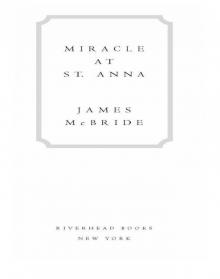 Miracle at St. Anna
Miracle at St. Anna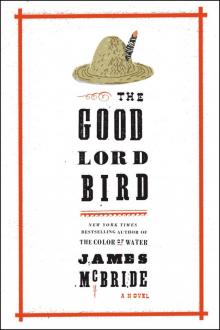 The Good Lord Bird
The Good Lord Bird Song Yet Sung
Song Yet Sung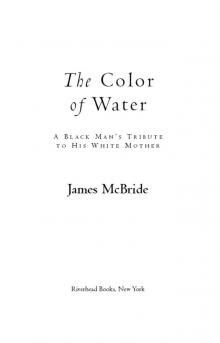 The Color of Water
The Color of Water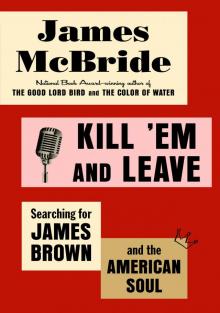 Kill 'Em and Leave
Kill 'Em and Leave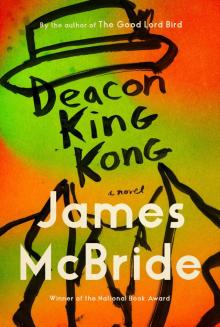 Deacon King Kong
Deacon King Kong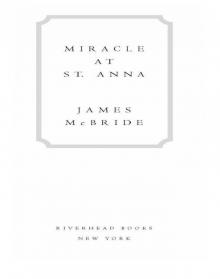 Miracle at St. Anna (Movie Tie-in)
Miracle at St. Anna (Movie Tie-in)